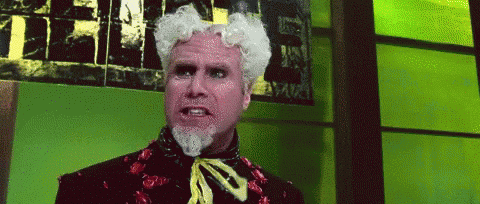Ecomedy of Economicerrors
Economics continues its unbroken run as the funniest "science."

The below image of a harried-looking nerd popped up on my LinkedIn feed today, and of course, you’re right. It’s my fault for using LinkedIn. But it did prompt me to whip this article together, which turned out to be easy, because it’s been brewing for a while.
I love economics. It’s always funny, and in recent times it’s been incredibly consistent, generating at least one belly-laugh a day, usually in the mornings when an earnest news media reports the latest round of prognostications like it’s a message from God.
Sometimes, though, something special comes along. My favourite economics article in recent times has to be this, from the Financial Times, with the apparently irony-free headline “Why are central bank forecasts so wrong?” Why indeed? The whole article is 100 percent worth a read, ideally without any liquids to hand to avoid the possibility of spit-takes, but I can’t resist posting some highlights.
Advanced economies are experiencing the most acute — and most enduring — outbreak of inflation for a generation. Yet almost all rate-setters failed to spot the degree to which price pressures would ratchet up — and stick around, despite record amounts of monetary and fiscal stimulus. Most of the Federal Reserve’s rate-setters failed to foresee that inflation would ever rise, and then overestimated the speed of its decline. Economists at the BoE and the European Central Bank underestimated the scale and persistence of inflation. Across the world, poor forecasts have contributed to central bankers failing to do their main job: maintaining price stability.
REALLY. Look, I’m just a layperson, but here’s a thought: Businesses exist to make profits and satisfy shareholders. No, that’s not ideal for… anything1, but that’s not my fault, it’s Milton Friedman’s. So, using the great man’s own rubric, if you just kind of give businesses lots of money, as central banks did during the early stages of the pandemic, they will generally:
a. Keep it and report amazing profits, inflating share prices, or,
b. There is no b.
Anyway. With prices (inflation) having increased from the colossal supply chain crunch engendered by the pandemic and corporate profiteers keen to capitalise on it, the economists who run central banks swung into action. They knew just what to do: increase interest rates, forcing businesses to fire people.2 Newly impoverished, these consumers would make the economically rational decision to stop buying things like… hey, what’s actually going up in price to cause this inflation anyway?
Food was the largest contributor to the March 2023 annual inflation rate. This was due to rising prices for vegetables, ready-to-eat food, and milk, cheese, and eggs.
Vegetable prices increased 22 percent in the 12 months to March 2023, while ready-to-eat food and milk, cheese and eggs increased 9.7 percent and 15 percent, respectively.
Ah. It’s food. So yeah, when interest rates went up, and people didn’t make the economically rational decision to starve, sellers put their prices up, because it turns out the incredibly obvious way to deal with increased costs and keep making exorbitant profits with a product that people mysteriously won’t stop buying is to put your prices up — which, for those keeping score at home, is what inflation is.
SO WEIRD. No wonder economists didn’t see it coming! Better put up interest rates again, that’ll help.
The Financial Times article continues, like the world’s driest stand-up comedian:
But what forecasts failed to show was that those rules only hold when inflation is broadly stable. Once price pressures soar — and stay high — people begin to believe that “the central bank is now talking nonsense”. Scepticism abounds, and recent inflation readings come to matter more than central banks’ insistence that their policies can quell price pressures.
Yes, people will generally believe that an institution (founded with the express intention and ability to ruin people’s lives en masse) is talking nonsense when its confident forecasts are confounded on a more or less daily basis by the ineffable nature of inconvenient fucking reality. What to do about this public distaste for economic predictions? Let’s ask economists, as the article rumbles inexorably towards this incredible punchline:
While other organisations have been less defensive, economists elsewhere caution that the public should focus less on whether or not projections turn out to be correct. That, they argue, is impossible and the public should focus more on whether the projections say something insightful about the economy at this point in time.
That is so improbably funny that without a finely-honed economic sense of humour like mine you might have missed the joke. Let me explain while trying not to laugh too hard because I still can’t believe they said the quiet part quite so loud: because their predictions keep turning out to be wrong, economists are asking us to take a radically different view of the word “prediction.” Rather than assessing an economic prediction’s success using the conventional calibration — whether or not it happens — we are asked to reflect on whether the prediction tells us anything about the present.
In other words, economics is proudly and loudly telling us not to use it for what it’s almost exclusively used for: what might happen in the future. Instead, economists want us to look at economics like this:

Or maybe it’s more like this:
Now that economists are finally at the stage of admitting that economic orthodoxy is actually a very large and expensive performance art piece that can’t predict anything but (coincidentally?) is very good for rich people’s bank balances, I hope we can consign it to where it clearly belongs: a museum.




